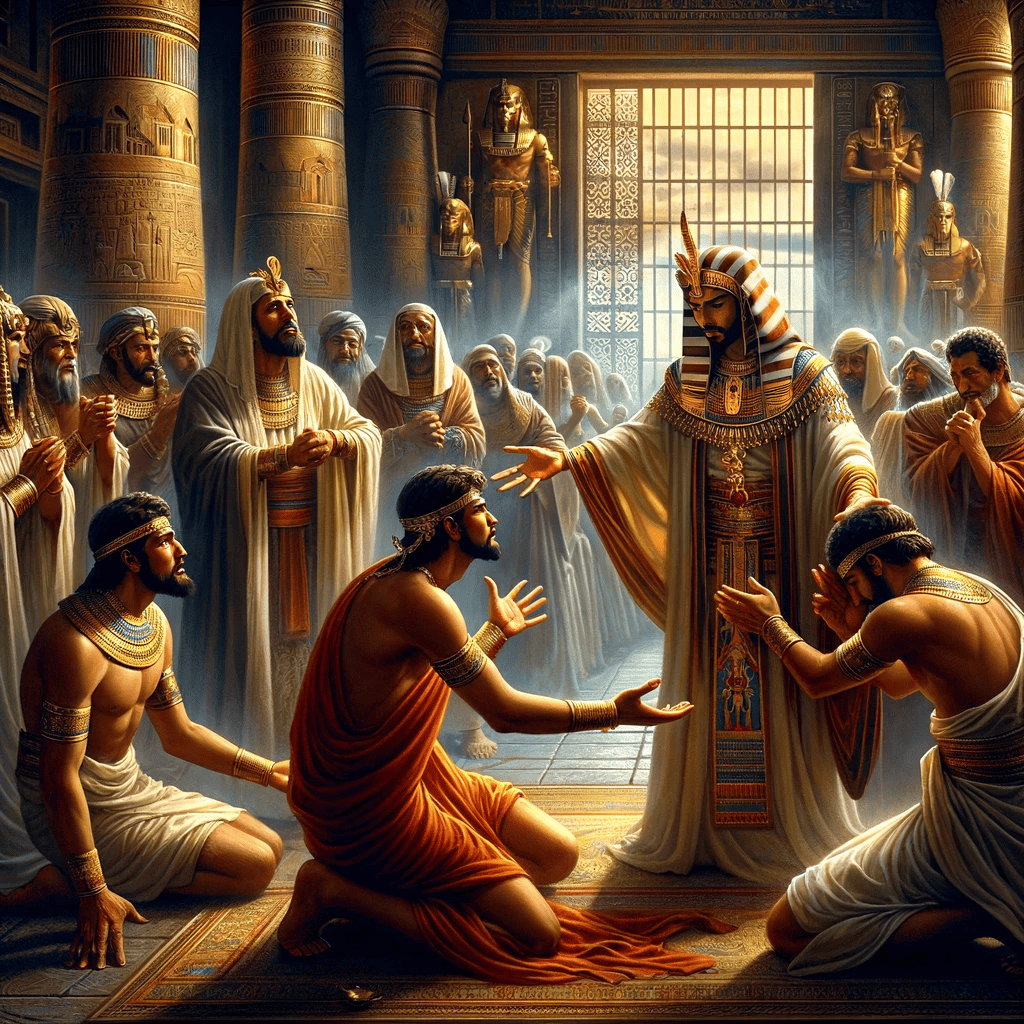
The story of Joseph and his brothers, found in Genesis chapters 42 through 45, is a powerful narrative of reconciliation and forgiveness. It unfolds as follows:
Joseph, once the favored son of Jacob, had been sold into slavery by his jealous brothers. Despite his dire circumstances, Joseph rose to become the governor of Egypt, second only to Pharaoh himself, due to his ability to interpret dreams and his wise management of Egypt’s resources during a time of famine.
Back in Canaan, the famine had also taken its toll, and Jacob sent his sons to Egypt to buy grain. Upon their arrival, they did not recognize Joseph, but he immediately knew them. Instead of revealing his identity, Joseph tested his brothers, accusing them of being spies. After a series of events, Joseph demanded that his brothers bring their youngest brother, Benjamin, to Egypt as proof of their honesty.
Upon their return with Benjamin, Joseph continued his test to see if his brothers had changed. He planted a silver cup in Benjamin’s sack and then accused him of theft. When the cup was found, Joseph declared that Benjamin would become his slave as punishment. This moment was crucial, as it revealed whether the brothers had truly changed. Judah, one of the brothers, offered himself as a slave in place of Benjamin, showing genuine remorse and willingness to sacrifice for his family.
Moved by his brothers’ transformation, Joseph could no longer contain himself. He revealed his true identity to his astonished brothers, saying, “I am Joseph, your brother, whom you sold into Egypt.” The revelation was shocking, and his brothers were speechless, filled with fear and guilt for what they had done. However, Joseph comforted them, saying, “Do not be distressed or angry with yourselves because you sold me here, for God sent me before you to preserve life.”
Joseph explained how God had orchestrated his journey to Egypt to save their family and many others from famine. He urged his brothers to return to Canaan, bring their father, Jacob, and their families to Egypt, where he would provide for them. The reunion was emotional, with Joseph and his brothers embracing and weeping together, healing the deep wounds of their past.
Finally, the brothers returned to Canaan with the good news. Jacob was overjoyed to learn that Joseph was still alive, and the entire family moved to Egypt, where Joseph welcomed them with open arms. This reunion marked a new beginning for Jacob’s family, now united and reconciled.
This profound story of reconciliation not only restored the broken relationship between Joseph and his brothers but also served as a pivotal moment for the entire family of Israel, setting the stage for their future as a nation within Egypt.
As Joseph settled his father and brothers in the land of Goshen, a region of Egypt, the family began to prosper and multiply greatly. This time of peace and prosperity was a direct result of Joseph’s forgiveness and his strategic planning during the years of famine. The narrative underscores the theme that what was intended for harm, God used for good, not only for the immediate survival of Joseph’s family but for the preservation of the future nation of Israel.
The story also highlights the importance of seeing beyond personal pain and grievances to understand the bigger picture of God’s plan. Joseph’s ability to forgive his brothers and recognize God’s hand in his journey reflects a profound spiritual maturity and a deep faith in God’s sovereignty.
Moreover, this narrative teaches the value of repentance and transformation. The brothers, who had once been driven by jealousy and hatred, demonstrated genuine remorse and a willingness to change. This change of heart was crucial for the reconciliation process, showing that forgiveness is not just about the person who forgives but also about the transformation of those who are forgiven.
The reunion of Joseph with his father, Jacob, is another poignant moment in the story. Jacob, who had mourned the loss of Joseph for many years, thinking he was dead, experienced a great joy and relief upon discovering that his son was alive and thriving. This reunion symbolizes the restoration of what was lost and the healing of a father’s broken heart.
In conclusion, the story of Joseph and his brothers is a timeless tale that resonates with themes of forgiveness, redemption, and the mysterious ways in which God works through human history. It serves as a powerful reminder of the possibility of reconciliation, even in situations that seem irreparable, and the importance of trusting in God’s plan, even when it is not immediately understandable. Through Joseph’s story, we learn that with faith, forgiveness, and love, healing and restoration are always possible.